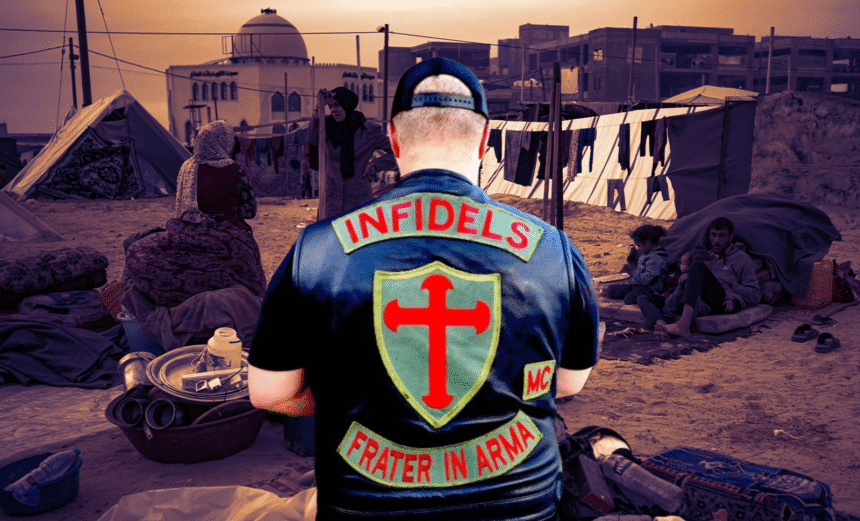A new investigation has revealed that members of a U.S.-based anti-Islam biker gang are working as security contractors at humanitarian aid distribution sites in Gaza, sparking outrage among human rights groups and raising questions about the militarization of relief operations. Since May 2025, the Gaza Humanitarian Foundation (GHF), a U.S.- and Israeli-backed relief group, has been running food distribution centers in Rafah, Khan Younis, Tal al-Sultan, the Saudi neighborhood, and Wadi Gaza. To secure its operations, GHF hired UG Solutions, a North Carolina-based private contractor, which in turn recruited members of the Infidels Motorcycle Club (Infidels MC), a gang notorious for its Islamophobic rhetoric and provocative symbolism.
The Infidels MC was founded in 2006 by U.S. veterans of the Iraq war and has long been associated with anti-Muslim provocation. Members frequently brandish tattoos of “1095,” a reference to the year Pope Urban II launched the First Crusade, and have staged pig roasts during Ramadan as an act of defiance against Islam. According to multiple reports, at least 10 identified members of the gang have been deployed through UG Solutions to Gaza aid sites, with as many as 40 suspected to be on the payroll. Some hold leadership positions, overseeing armed security operations at distribution centers where tensions are already high.
At the center of the controversy is Johnny “Taz” Mulford, the leader of the Infidels MC and a former U.S. Army sergeant. Mulford reportedly serves as UG Solutions’ “country team leader” in Gaza and is believed to have recruited fellow gang members into senior roles within the project. Others include Larry “J-Rod” Jarrett, the club’s vice president who now handles logistics for the foundation, and figures such as Josh Miller, Bill “Saint” Siebe, and Richard “A-Tracker” Lofton, who have been linked to supervisory roles in security operations. While UG Solutions insists it hires based on experience and not personal affiliations, critics argue that placing men with such backgrounds in charge of aid sites in a Muslim-majority territory is dangerously provocative.
The presence of Infidels MC members has drawn widespread criticism, particularly as reports of civilian deaths at or near GHF aid distribution sites have increased. The United Nations has attributed most of these deaths to Israeli security forces, but testimonies from former contractors suggest that UG Solutions personnel have at times used warning shots to disperse crowds and may have opened fire in other instances. With aid lines often chaotic and desperate civilians surging forward in hopes of food, the use of armed contractors with ideological biases is viewed by many as a recipe for disaster.
The Council on American-Islamic Relations (CAIR) has been especially vocal, calling for GHF to be barred from operating in Gaza and demanding investigations into possible crimes, discrimination, and human rights violations. “You cannot have a group of men who celebrate Islamophobia running armed checkpoints in Gaza,” CAIR stated in a recent press release, warning that the situation undermines the neutrality and legitimacy of humanitarian work. Aid experts echo this concern, noting that perceptions matter as much as actions; the involvement of a group with Crusader iconography risks eroding trust between aid providers and the Palestinian population they serve.
Both UG Solutions and GHF have attempted to defend their positions. UG Solutions has denied that its personnel have fired directly on civilians, though it admits to using warning shots, and insists that all recruits pass standard background checks. GHF has stressed that it maintains a “zero tolerance” policy toward discrimination and that Mulford himself has not been active with the organization since August. Still, critics argue that these assurances ring hollow given the gang’s reputation and the evidence of its members’ current involvement. The optics, they say, are catastrophic: a U.S. biker gang that once celebrated “crusades” now wielding weapons in Gaza under the banner of humanitarian aid.
The controversy has broader implications for the way aid is delivered in conflict zones. Humanitarian operations are meant to be politically neutral and grounded in international law, yet the outsourcing of security to private contractors with ideological baggage undermines that neutrality. Observers warn that the use of Infidels MC members as aid security not only risks escalating tensions on the ground but could also set a dangerous precedent for future relief missions. For Palestinians already struggling under blockade, bombardment, and scarcity, the arrival of armed bikers with open hostility toward Islam is more than just unsettling; it represents another layer of insecurity in an already volatile landscape.
In the end, the revelations about the Infidels MC highlight a stark reality: when aid becomes militarized and politicized, the line between relief and repression blurs. Whether or not GHF and UG Solutions continue employing these men, the damage to trust and credibility may already be done. For Gaza’s civilians, who depend on aid for survival, the consequences of this experiment in security outsourcing could be devastating.












